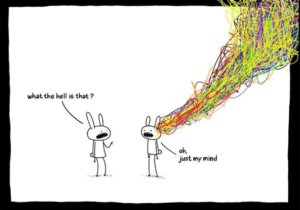Dirty pain in the night
 Today a student, let’s call her Joy, told me about her back pain, which had been flaring up. It had kept her awake quite a bit last night. And then she added: “But it didn’t bother me so much, because I knew that I didn’t have to work today.”
Today a student, let’s call her Joy, told me about her back pain, which had been flaring up. It had kept her awake quite a bit last night. And then she added: “But it didn’t bother me so much, because I knew that I didn’t have to work today.”
I’m sure you are familiar with something like this. It is, actually, so familiar that we might not even think twice when we hear or experience it.
Do you know what I’m pointing to? What Joy didn’t need to say was that if she would have had to work today, she would have suffered a lot more from her problems sleeping last night. There she was, in bed with the back pain, and depending of what she expected to happen the next day, she suffered more or less – in that moment.
Are we saying that we suffer now about something that might happen later? Honestly – how smart is that? And yet, don’t we do it all the time?
In mindfulness practice we talk about “clean” pain and “dirty” pain, or “primary” and “secondary” suffering. The clean pain in this case is the back pain itself. The dirty pain is the extra suffering we add by the meaning the pain has for us. As we are usually not aware of the process we just feel the sum total of the pain.
Sometimes the anticipated future is pretty predictable (you DO have to work the next day) but often it’s just an assumption (like “I will never find a soul mate”). In either case it’s about the future, aka not here yet.
So what do we do? The first step is always becoming aware of the stressful moment. Then asking yourself: where is the suffering in this moment? What is the clean pain of the situation, and what is the dirty pain? The dirty pain is usually a mix of a storyline and a resulting negative emotion. Once we get more clarity into what’s happening, we can move the attention away from the storyline and stay with the physical sensations of the emotion in the body, like the tension in the shoulder or the nervous feeling in the stomach.
Once we have separated this, it becomes simple: we know how to feel and follow a sensation in the body – that’s exactly what we do when we feel the breath during meditation. And we know how to bring the attention back when it gets lost again in the story. Problem solved ;).
